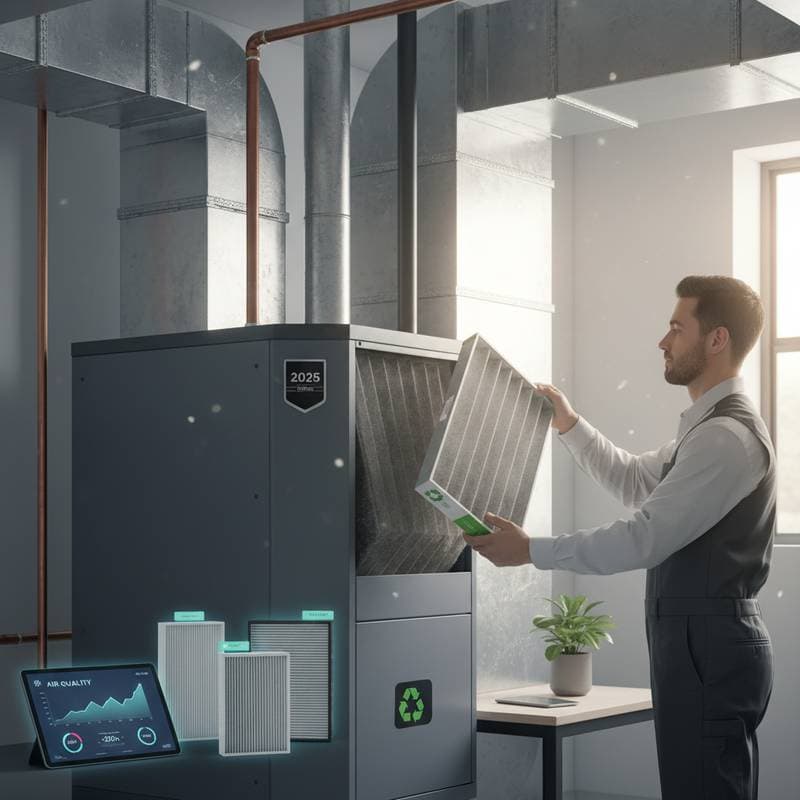Key Takeaways
- Prepare your HVAC for spring by upgrading air filters to enhance air quality and operational efficiency.
- Select filters based on household requirements, such as allergy management or energy conservation.
- Implement consistent replacement routines and proper sizing to prolong equipment durability and decrease expenses.
Selecting the Ideal Air Filter for Your Residence
Brief Overview: Fiberglass filters offer affordability yet require frequent changes. Pleated and high-efficiency variants provide extended durability and superior capture of microscopic particles.
Different filter types address specific needs. The optimal choice hinges on residence dimensions, air purity objectives, and occupant health considerations.
| Filter Type | Typical Lifespan | Filtration Strength | Cost Range | Best For |
|---|---|---|---|---|
| Fiberglass | 30 days | Basic dust control | Low | Budget-focused upkeep |
| Pleated | 60 to 90 days | Moderate to high | Medium | Everyday family homes |
| Electrostatic | 90 days or washable | High | Medium to high | Allergy mitigation |
| HEPA-grade | Up to 6 months | Very high | Higher | Delicate indoor settings |
Fiberglass filters represent the most basic selection, effectively trapping large debris like dust and lint particles. Pleated filters employ folded media to increase surface area, thereby capturing smaller contaminants with greater effectiveness. Electrostatic models utilize static charge to draw in dust, whereas HEPA-grade options eliminate ultrafine allergens, including smoke particles and pet dander.
For households with allergy-prone individuals or pets, opt for pleated or HEPA-grade filters to achieve substantial symptom relief. Residences with low dust levels or limited occupancy often perform adequately with standard pleated filters. Consider consulting your HVAC manual to verify compatibility before installation.
Determining Replacement Frequency for Air Filters in Spring
Brief Overview: Exchange filters every one to three months, adjusted for type, pet presence, and system activity. Perform monthly inspections during peak pollen seasons.
Spring weather introduces variable temperatures, causing HVAC systems to operate in cycles. Pollen and outdoor dust infiltrate rapidly under these conditions. Conduct visual checks each month; replace any filter appearing discolored or obstructed without delay.
Establish a maintenance calendar that aligns efficiency with budget:
- Fiberglass filters: Monthly intervals
- Pleated filters: Every two to three months
- HEPA or electrostatic filters: Every three to six months
Households featuring pets or high activity levels should adhere to the more frequent schedule. Track usage patterns to refine this routine over time.
Evaluating the Value of Reusable Filters
Brief Overview: Reusable filters prove beneficial for dedicated users who maintain cleaning protocols and confirm system compatibility.
Washable filters appeal due to potential long-term cost reductions. Initial purchase prices exceed disposables, yet they endure for multiple years with proper care. Clean them by rinsing under lukewarm water, allowing full drying before reinsertion.
Maintenance demands consistency to avoid drawbacks. Neglect may lead to moisture retention and microbial growth. Although filtration efficiency slightly trails disposable pleated options, environmentally conscious homeowners benefit from reduced waste. Those prioritizing ease may prefer single-use alternatives.
Identifying Indicators for Urgent Air Filter Replacement
Brief Overview: Reduced airflow, extended operation cycles, and visible dust accumulation indicate filter exhaustion.
Clogged filters force HVAC components to overwork, resulting in prolonged runtime and temperature inconsistencies. Additional symptoms include accelerated dust settlement on surfaces, unpleasant odors upon system activation, and heightened indoor allergy responses.
Address these promptly by inspecting the filter compartment. A swift replacement typically restores balanced performance and airflow within a short period. Document occurrences to anticipate future needs.
Emerging Trends in HVAC Filtration for Spring 2025
Brief Overview: Current preferences include pleated filters crafted from sustainable materials paired with integrated smart monitoring technologies.
Sustainability drives innovation in filtration products this season. Biodegradable fiber compositions and recyclable frames gain prominence among eco-aware consumers. Affordable smart sensors now monitor filter status via mobile applications, simplifying air quality oversight.
Visual indicators, such as color-changing media, assist in timely replacements by altering hue upon dust saturation. Aesthetic enhancements extend to filter housings, featuring streamlined designs that integrate seamlessly into utility areas. These developments blend functionality with user-friendly maintenance.
Frequently Asked Questions from Homeowners
Does a High-Efficiency Filter Impair Airflow Excessively?
Filters exceeding MERV 13 may overburden standard residential blower motors. Review your equipment specifications or engage a professional technician to assess suitability prior to upgrading.
How Can You Confirm HEPA Filter Compatibility with Your System?
Conventional home HVAC units rarely accommodate full HEPA installations due to their bulk and density. Substitute with high-MERV pleated filters to approximate benefits while preserving airflow.
Do Air Filter Subscription Services Provide Sufficient Value?
Subscriptions ensure timely deliveries of appropriately sized filters, ideal for those prone to oversight. They promote steady system performance through automated reminders and consistent supply.
Is Filter Replacement Necessary During Low HVAC Usage Periods?
Affirmative; environmental contaminants accumulate regardless of operation frequency. Filters degrade progressively, necessitating periodic renewal to sustain efficacy.
Can Enhanced Filters Mitigate Household Odors?
Certain models incorporate activated carbon layers to neutralize scents from culinary activities, animals, or tobacco. Seek pleated variants specified for odor absorption or carbon integration.
Practical Strategies for Enduring HVAC Efficiency
Incorporate these targeted practices to sustain optimal performance beyond the initial spring update:
- Install filters precisely matching your system's dimensions to prevent air leaks and maximize capture rates.
- Pair filter upgrades with annual professional inspections to detect underlying issues early.
- Monitor indoor humidity levels, as excess moisture accelerates filter clogging; employ dehumidifiers if needed.
- Educate all household members on filter location and basic inspection techniques for collective responsibility.
- Experiment with MERV ratings incrementally, starting at 8 to 11, to balance filtration without straining components.
Achieving Sustained Indoor Air Quality Benefits
Upgraded filters transform daily living by minimizing allergens and stabilizing temperatures. Homeowners report fewer health disruptions and measurable utility savings. Commit to these refinements for a healthier, more comfortable residence year-round.

